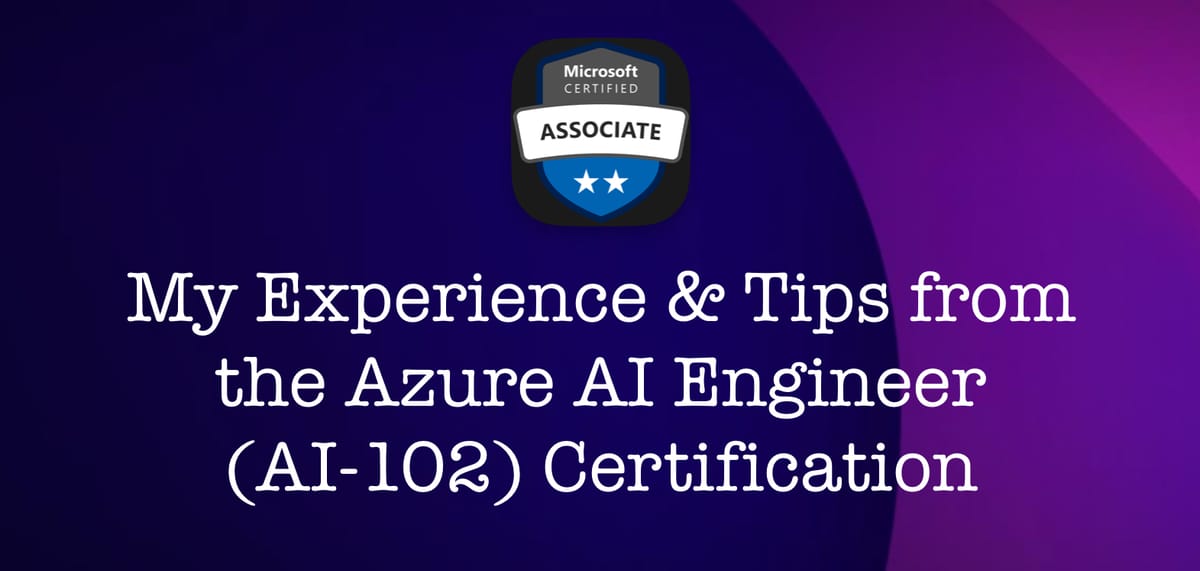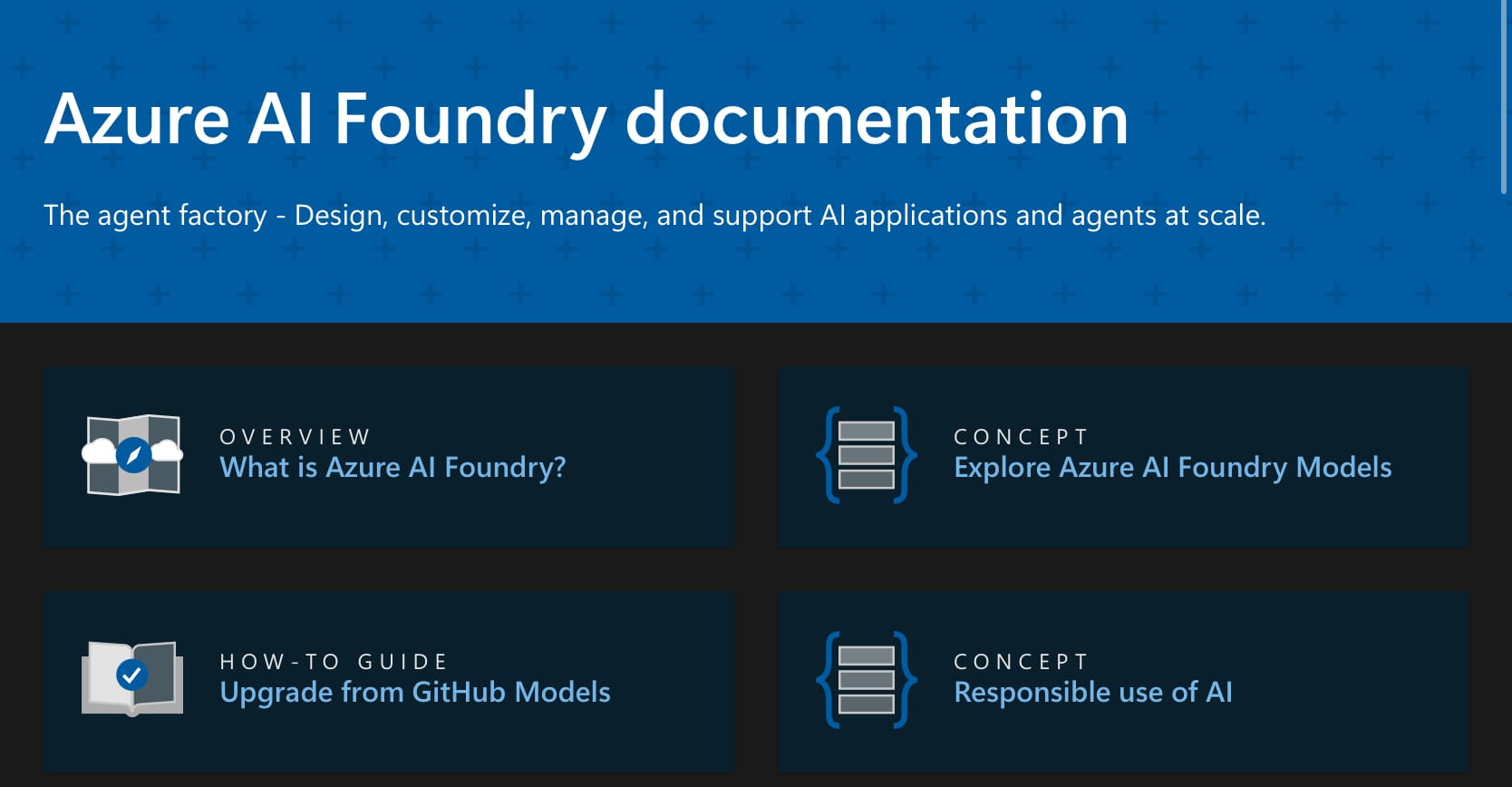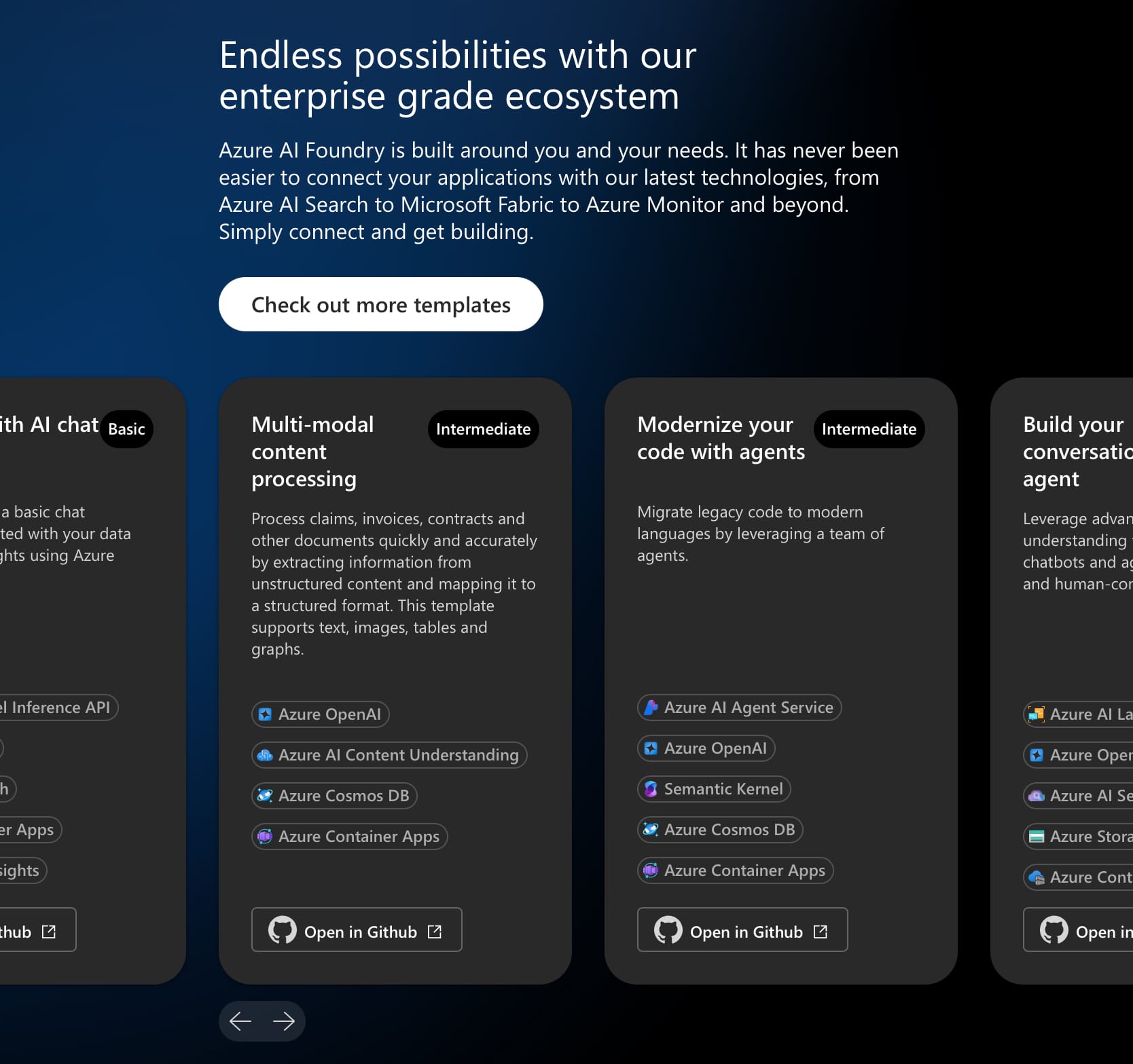Azure AI Engineer Associate (AI-102) Certification - My Experience & Recommendations

TLDR
The Azure AI Engineer Associate certification is intended to cover a wide range of AI/ML functionality available on Azure, but with a focus on Generative AI (LLMs, agents). Given that I saw the Microsoft Learn modules change during my preparation, and the rate of change in the world of AI, I would expect the training collateral and exam to continue to change in the near future. As a result, I would suggest that anyone undertaking the exam doesn't draw out the preparation period, and that those who pass the exam occasionally revisit the learning pathway to review any new material.
Topics covered are focused on core Azure AI services, pro-code development, deployment & integration, and monitoring with less content on solution design or performance. Though Python or C# knowledge is required, this isn't especially broad and those with intermediate skills in either should have no problems as the core requirement is specific to programmatically interacting with Azure AI services and no more.
Though I think the certification is well aligned for AI practitioners working on Azure, I believe that any engineers or solution architects interested in, or needing to prepare for, working with Azure AI services would benefit from undertaking the AI-102 exam.
Who is the AI Engineer Certification Aimed At?
The AI-102 exam targets professionals designing and deploying enterprise AI solutions on Azure. Obviously, this is targeted at aspiring AI Engineers, but ideal candidates include (existing or aspiring):
| Role | Relevance to AI-102 |
|---|---|
| AI Engineers | Core audience—builders of production-grade models, RAG pipelines, and multi-agent systems. |
| Azure Developers | Developers integrating AI into apps via REST APIs, Python SDKs, or containerization. |
| Solution Architects | Designers of end-to-end AI systems, including governance, scalability, and cost optimization. |
| Data Scientists | Practitioners transitioning ML models to Azure, focusing on MLOps and Responsible AI. |
Of course, this isn't extensive, and the above table is based on the guidance Microsoft have shared. I'd also suggest that there's good reason for data engineers and analysts to undertake the AI Engineer certification given how crucial data (quality, operations, governance etc.) is to any AI solution as well as how much overlap there is with the required skillset.
There is some value in broader audiences considering specific elements of the Microsoft Learn pathway, but it's important to remember that there is an expectation of familiarity with Azure concepts (resources, databases, storage accounts, SharePoint) and one of C# or Python.
Exam Preparation

Prior to undertaking the exam, the only resources I utilized were the MSLearn pathway and practice assessment, both because I have been using many of the components being assessed as part of my role, and also as I was keen to understand if these alone would be enough to pass the exam (a question I've been asked on other certs before).
In short, I do think the learning pathway is enough preparation on it's own, but only if you pay particular attention to the labs/tutorials or have experience building AI solutions on Azure, and spend some time familiarizing yourself with MSLearn AI documentation. I think the better option is to also consider a couple of additional resources such as John Savill's study cram and Microsoft's AI Engineer Applied skills.
Resources:
- AI-102 Landing Page
- AI-102 Study Guide
- John Savill's AI-102 Study Cram
- Azure AI Documentation Hub
- AI Engineer Applied Skills
- Semantic Kernel Tutorials
My Experience and Recommendations

- Master Microsoft Learn. I've called MSLearn out in previous certification blogs as you are able to open an MSLearn window in the exam but you can't use it consistently due to time constraints. However, this is the first exam that, for one reason or another, I completely forgot about using MSLearn and there are some questions that you're not likely to remember specific detail for, such as those around service-specific limitations (e.g., Document Intelligence’s 500-page PDF cap) and pricing tiers.
- Understanding multi-modal processes is important. I don't mean this specific to multi-modal GenAI models, but more around considering how to design AI solutions where both image (or document) and text analyses are required. Having clarity on the order of steps, services, and inputs vs. outputs will be beneficial throughout the exam. Utilizing AI documentation and even drawing out solutions on paper / whiteboard / tablet during exam preparation can be helpful.
- Content safety was a popular component. I would suggest that content safety appeared in 15-20% of questions, far more than I had expected. Prepare to be comfortable around blocklists for user-generated content, interpreting harm severity scores & harm detection, and Azure AI Content Safety workflows.
- Agents might be "new" but they are pivotal. Despite being new, I saw a number of scenario-based questions focused on Semantic Kernel and multi-agent orchestration. Even for those with existing AI Engineering expertise, it's not likely that you'll be as familiar in these areas as some others.
- Focus coding prep on integration skills. The pre-requisites require Python or C# skills, which will help, but I don't think advanced coding skills are at all required for the exam, and no questions ask you to code but, rather, interpret (pick from a multiple choice selection). I would suggest focusing on configuring REST APIs, SDK authentication, and error handling—not syntax. Make sure you're familiar with identifying correct SDK methods (e.g.,
analyze_image()vs.detect_objects()) and troubleshooting failed API calls. - Take a balanced approach to ML service coverage. No single Azure AI service dominated; expect equal emphasis on vision, NLP, search, document intelligence, and generative AI.
- Scenarios can be tricky: Scenarios like “Design a multi-agent system to resolve IT tickets” required understanding agent roles, fallback workflows, and human-in-the-loop patterns. Ultimately, I believe the best prep here is to undertake as many tutorial-style modules as possible as well as typical exam prep around question format (identifying keywords). Prior to actually working through tutorials or applied skills, a good habit that can help learning for scenario questions is to write down your order of operations (3-6 steps) and validate as you progress.
- Knowing out of the box functionality is important. Of course entity extraction and document intelligence are likely to come up quite a bit during the exam, but it's really helpful to know things like what is covered under entity categories and prebuilt document intelligence models.
- Of all the AI/ML services, speech services is not likely to be focused on. Understandably, digging in to speech services often means including things that require audio (speech to text or vice versa) which isn't going to be viable in the current exam format. It's more likely that questions in this space cover things like making API calls or general solution design.
- Exam technique & trap questions: I didn't really see any true "trap" questions, but identifying keywords and knowing services inside and out is important. For example “Use Azure Bot Service for agent orchestration” was something I observed, but seeing the question highlight orchestration would point towards Semantic Kernel without spending time considering options in detail.
- Learning collateral is great, but nothing beats true hands-on experience. In my opinion, it's much easier learning by attaching to real-world use cases, even if they're made up. In my case, I designed a Fabric-integrated agent to analyze F1 telemetry data and generate pit-stop recommendations.
Note: If you've not undertaken an Azure exam before, it's worth doing a little reading on the scenario questions as they're not covered in the practice assessment. Usually you are presented with context and background in a format like a high level overview, required solution, then business and technical requirements. You get asked a series of questions, but once answered, you cannot return to change your answers. The biggest tip here is to try and minimize time wasted. In my opinion, that time is better spent on other questions where you're more likely to pick up marks or be certain on answers.